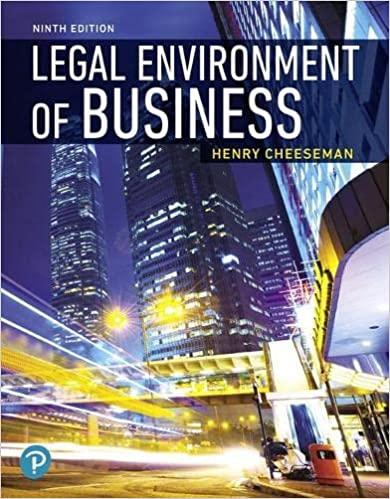Question
1. When can the government restrict first amendment religious rights of persons/businesses? Select all that apply. If it is not a substantial burden. If it
1. When can the government restrict first amendment religious rights of persons/businesses? Select all that apply.
If it is not a substantial burden.
If it is against public policy and public welfare.
If it is not a recognized religion.
the government can never restrict religious freedom.
2. The courts apply different levels of scrutiny, or "tests," to determine whether the law or action violates the equal protection clause. Which of the following test applies to matters of economic and social welfare and the easiest for the government to pass?
rational basis
intermediate scrutiny
strict scrutiny
minimum contacts
3. Which of the following is a specialized court in the NC Court system which hear cases involving complex corporate and commercial law.
Small Claims Court
Business Court
UCC Court
Profit Court
4. Which of the following is true about arbitration? Select all that apply.
parties can agree to have the arbitration be legally binding
parties can agree to have the arbitration be nonbinding
Parties can agree to arbitrate a dispute after it arises.
Almost any commercial matter can be submitted to arbitration.
5. Molly wants to sue her employer for age discrimination, but there is a the mandatory arbitration clause in her employment contract.
Molly will be allowed to take her employer to court.
Molly can choose to take her employer to court or arbitrate.
Molly will most likely have to arbitrate her claim.
Discrimination cases are not allowed to be arbitrated.
6. If Abe appeals his case, the appellate court -- Select all that apply
only hears questions of law.
only hears questions of fact.
can hear both questions of law and fact.
has appellate jurisdiction.
7. Bob and Steve are involved in an automobile accident. Bob decides to sue Steve for his injuries, so he files a complaint, a formal pleading that starts the lawsuit and sets out the allegations that Bob has against Steve. Bob has the complaint, along with a summons, served on Steve to give him notice of the lawsuit. If Steve does not respond to the complaint:
a default judgment may be entered against him.
a motion to dismiss may be filed against him..
a motion for summary judgment may be filed against him.
a motion for judgment on the pleadings may be filed against him.
8. In a civil case, the object is to
resolve a dispute to the satisfaction of all concerned parties.
take coercive action against a violating party.
punish a wrongdoer to deter others from similar actions.
obtain a remedy to compensate the injured party.
9. The basis of all law in the United States is
the U.S. Constitution.
laws passed by Congress.
case law.
regulations created by administrative agencies.
10. Which of the following statements are true about the U.S. Court System? Select all that apply-
To bring a case before the Supreme Court, a party requests that the Court issue a writ of certiorari.
There are appellate courts only on the federal level.
The federal courts are superior to the state courts.
There are 52 court systems.
Step by Step Solution
There are 3 Steps involved in it
Step: 1

Get Instant Access to Expert-Tailored Solutions
See step-by-step solutions with expert insights and AI powered tools for academic success
Step: 2

Step: 3

Ace Your Homework with AI
Get the answers you need in no time with our AI-driven, step-by-step assistance
Get Started


